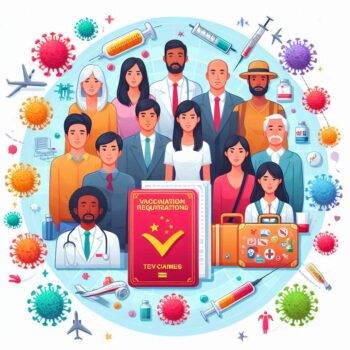
Planning a trip to China? Whether you’re traveling for work, study, or leisure, ensuring you have the necessary vaccinations is a crucial step for a safe and healthy experience.
This guide provides a detailed overview of mandatory and recommended vaccinations, along with practical tips to help you navigate the process smoothly.
Understanding Mandatory Vaccinations
Before entering China, certain vaccinations may be mandatory depending on your country of origin and recent travel history.
These requirements are designed to prevent the spread of infectious diseases.
Yellow Fever
- If you are traveling from a country with a risk of yellow fever transmission, you must present a valid International Certificate of Vaccination or Prophylaxis (ICVP) upon arrival in China. This requirement applies to travelers older than nine months.
- For a list of countries with yellow fever transmission, refer to the World Health Organization (WHO) (link).
Recommended Vaccinations for All Travelers
Even if certain vaccines are not mandatory, it is highly recommended to get vaccinated for the following diseases to protect yourself and others:
1. Hepatitis A
- Hepatitis A is a viral infection transmitted through contaminated food and water. Vaccination is recommended for all travelers to China, especially if you plan to eat at local restaurants or street food vendors.
2. Hepatitis B
- Hepatitis B is spread through blood and bodily fluids. Vaccination is advisable for travelers who may engage in activities that increase their risk, such as medical procedures, tattoos, or sexual contact.
3. Typhoid
- Typhoid fever is caused by consuming contaminated food or water. The vaccine is particularly recommended if you plan to visit rural areas or eat food from street vendors.
4. Japanese Encephalitis
- This mosquito-borne viral infection is more common in rural areas and during the summer months. If you plan to spend extended time in rural regions or during peak mosquito activity, consider getting vaccinated.
5. Rabies
- Rabies is transmitted through the bites of infected animals. If you plan to engage in outdoor activities, such as hiking or camping, or visit areas with a high risk of animal exposure, vaccination is recommended.
6. Polio
- Although polio is rare, it’s important to ensure you are up-to-date with your polio vaccine, especially if you haven’t had a booster shot in recent years.
For more information on these vaccines, visit the Centers for Disease Control and Prevention (CDC) Travel Health page (link).
Additional Vaccinations for Specific Travelers
Depending on your travel plans and personal health, additional vaccinations may be recommended:
1. Meningococcal
- If you’ll be staying in crowded conditions or attending large gatherings, consider getting vaccinated against meningococcal meningitis.
2. Influenza
- The flu vaccine is recommended, especially during the winter months when flu activity is high in China.
3. Tetanus, Diphtheria, and Pertussis (Tdap)
- Ensure you’re up-to-date with your Tdap vaccine to protect against tetanus, diphtheria, and whooping cough.
Vaccination Timelines and Logistics
When to Get Vaccinated
- Some vaccines, such as Japanese Encephalitis, require multiple doses over several weeks. It’s best to consult a healthcare provider 4–6 weeks before your trip to ensure you have enough time to complete your vaccination schedule.
Where to Get Vaccinated
- Visit a travel clinic or your local healthcare provider for vaccinations. In the U.S., you can find travel clinics through the CDC’s Travel Health Clinics Directory (link).
Documentation
- Carry proof of vaccination, such as an International Certificate of Vaccination or Prophylaxis (ICVP), especially for mandatory vaccines like yellow fever.
- For COVID-19, ensure your vaccination certificate is in a format accepted by Chinese authorities. Some travelers may need to upload their vaccination records to a government portal before departure.
Travel Health Tips for China
In addition to vaccinations, follow these health tips to stay safe during your trip:
1. Maintain Hygiene
- Wash your hands regularly with soap and water, especially before eating. Carry hand sanitizer for situations where soap and water are unavailable.
2. Food and Water Safety
- Stick to bottled or boiled water, as tap water in China is not safe for drinking. Avoid consuming raw or undercooked foods, and choose reputable restaurants when dining out.
3. Insect Protection
- Use insect repellent containing DEET, wear long sleeves and pants, and sleep under mosquito nets if you’re staying in areas with a high risk of mosquito-borne diseases.
4. Medical Kit
- Pack a travel medical kit with essentials such as over-the-counter medications, bandages, and any prescription medications you may need. Be cautious when purchasing medications in China, as counterfeit drugs are a known issue. Stick to reputable pharmacies like Guoda Pharmacy or Tongrentang.
Costs and Insurance
Vaccination costs vary depending on your location and healthcare provider.
Some travel insurance plans cover vaccinations, so check with your provider before scheduling your appointments.
For expats or long-term travelers, vaccinations like flu shots and boosters may also be available at international clinics in China, such as:
Conclusion
Ensuring you have the necessary vaccinations is a crucial step in preparing for your trip to China.
By staying up-to-date with mandatory and recommended vaccines, you can protect yourself and those around you from preventable diseases.
Remember to consult with a healthcare provider well in advance of your travel dates to receive the appropriate vaccinations and health advice.
For the latest travel health updates, visit the CDC Travel Health (link) or WHO (link) websites.
Safe travels!


